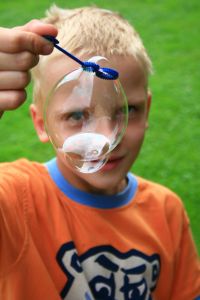“It seems to me that the natural world is the greatest source of excitement, the greatest source of visual beauty, the greatest source of intellectual interest. It is the greatest source of so much in life that makes life worth living.” ~ David Attenborough, English broadcaster and naturalist
Today is Earth Day. We are reminded of the need to protect our Earth with all its wonders and beautiful resources: the majestic glaciers, magnificent oceans, captivating tall trees, vast grasslands, and all precious life forms. Today, Attachment Parenting International (API) observes the significance of our Earth and nature as a valuable resource for our children’s well-being.
Connecting with nature — spending time outdoors — provides children with the opportunity to freely engage in exploration, observation, creativity, and physical activity. It promotes the development of physical, emotional, and spiritual balance children need to flourish.
With the prevalence of electronic devices, overscheduling and the increasingly limited availability of natural settings, children nowadays have little opportunities to spend time outdoors and in nature. Television, the internet and social media are at their fingertips: They spend many hours being connected, but yet disconnected — from their natural environment.
In his 2005 book, Last Child in the Woods, journalist Richard Louv coined the term “Nature Deficit Disorder,” referring to the negative effects resulting from children spending less time outdoors. In his groundbreaking work, Louv sheds light on this important issue that deeply affects our children.
In this Parent & Child magazine article, Louv explains why nature is vital for children: As human beings, our connection to nature is biologically innate. Nature deficit disorder is not a medical condition but a description of the human costs of alienation from nature. This alienation damages children, and some of the consequent problems are depression, obesity, and attention problems.
In his Orion magazine article, “Leave No Child Inside,” Louv discusses the need behind the movement to reconnect kids with nature: “As one suburban fifth grader put it to me, in what has become the signature epigram of the children-and-nature movement: ‘I like to play indoors better ’cause that’s where all the electrical outlets are.’”
Due to the movement, there is growing dialogue on the subject of children and nature among educators, health care providers, recreation companies, residential developers, urban planners, conservation agencies, academics, and others.
There is also a growing body of research on the problem of children’s disconnection from the natural environment, and the benefits of increased connection. Some of the benefits discussed in this Natural Learning Initiative piece are:
- Supports creativity and problem solving
- Enhances cognitive abilities
- Improves social relations
- Improves self-discipline
- Reduces stress
- Reduces Attention Deficit Hyperactivity Disorder (ADHD) symptoms
- Increases physical activity.
Children’s immersion and connection with nature also has profound implications on future conservation and the direction of the environmental movement. If, as a society, we would truly understand the benefits nature has to offer to our children, we would be more inclined to re-evaluate our relationship with nature and the urgency to protect our beautiful Earth.
Additional API Resources for Earth Day
“Playful Parenting with Larry Cohen,” author of Playful Parenting, The Art of Roughhousing, and Picnic on a Cloud, in this API Teleseminar — now just $9 for your audio recording!
“Nature’s toys” from AP Month 2011
More professional insight from The Attached Family online magazine:
“Conscious Living with Lisa Reagan,” executive editor of Kindred Media & Community, cofounder of Families for Conscious Living, and member of API’s Resource Advisory Council
“Parenting for a Sustainable World: Cultivating a Reverence for Life” by Lysa Parker, cofounder of API and coauthor of Attached at the Heart
And personal stories from other APtly Said blog posts:


